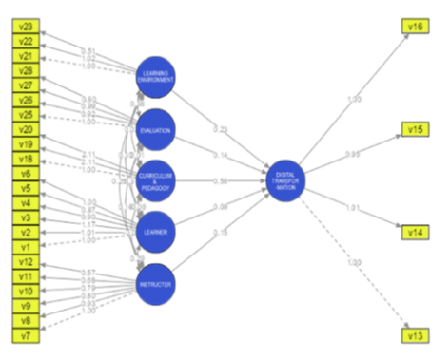


Indian Journal of Science and Technology
DOI: 10.17485/IJST/v16i48.1825
Year: 2023, Volume: 16, Issue: 48, Pages: 4624-4630
Original Article
M K Shreeharsha1, P Nagesh2, M B Kavyashree3*
1Research Scholar, JSS Science and Technology University, Mysuru, Karnataka, India
2Professor, JSSCMS, JSS Science and Technology University, Mysuru, Karnataka, India
3Assistant Professor, JSSCMS, JSS Science and Technology University, Mysuru, Karnataka, India
*Corresponding Author
Email: [email protected]
Received Date:20 July 2023, Accepted Date:22 November 2023, Published Date:30 December 2023
Objectives: To examine the factors influencing Digital Transformation in Learning and their association with Digital Transformation considering professionals working in educational institutions and universities offering digital platform in learning. Methods: To gather the relevant data, the survey method adopted was cross sectional in nature. Reliability Analysis, Convergent Validity, Structural Equation Modelling were considered for assessing the data. Data was gathered from 316 professionals working in Karnataka Universities in India having digital platforms to enable learning. Findings: The model indices were found to be acceptable. The RMSEAp value was found to be less than 0.05 indicating a good model fit. Values of AVE ranged between 0.511 to 0.926 crossing the cut-off value 0.5. The path model statistics p value obtained were less than 0.05, thus proving there was an association between the factors considered in the present research. The significant factors influencing digital transformation in learning were identified with significance values as: Instructor (0.01), Learner (0.04), Course Curriculum (0.01), Evaluation (0.01) and Learning Environment (0.01). The significant values were found to be below the threshold value of 0.05, therefore proved to be the significant factors having an impact on digital learning. Novelty: The present research is an attempt to identify the significant factors influencing digital transformation in learning in the universities located in Karnataka State of India. The research adds further knowledge to the existing works in the similar area by focusing on the most relevant factors required for the successful execution of digital platform for learning which is currently booming in the education sector.
Keywords: Digital Transformation, Learning, Learner, Instructor, Curriculum, Evaluation, Learning Environment
© 2023 Shreeharsha et al. This is an open-access article distributed under the terms of the Creative Commons Attribution License, which permits unrestricted use, distribution, and reproduction in any medium, provided the original author and source are credited. Published By Indian Society for Education and Environment (iSee)
Subscribe now for latest articles and news.